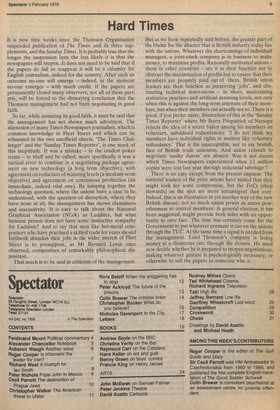Hard Times
It is now nine weeks since the Thomson Organisation suspended publication of The Times and its three supplements, and the Sunday Times. It is probably true that the longer the suspension lasts the less likely it is that the newspapers will reopen. It does not need to be said that if the papers do fail to reappear it will be a calamity for English journalism, indeed for the country. After such an outcome no-one will emerge — indeed, at the moment no-one emerges — with much credit. If the papers are permanently closed many observers, not all of them parti pris, will be forced to the dismaying conclusion that the Thomson management had not been negotiating in good faith.
So far, while assuming its good faith, it must be said that the management has not shown much adroitness. The alienation of many Times Newspapers journalists, which is common knowledge in Fleet Street and which can be witnessed in the two unofficial sheets, 'The Times Challenger' and the 'Sunday Times Reporter', is one mark of this ineptitude. It was a mistake — in the crudest poker terms — to bluff and be called; more specifically it was a tactical error to combine in a negotiating package agreement on new technology (a long term objective), with agreement on reduction of manning levels (a medium-term objective) and agreement on continuous production (an immediate, indeed vital one). By lumping together the technology question, where the unions have a case to be understood, with the question of disruption, where they have none at all, the management has shown clumsiness and insensitivity. It is easy to talk about the National Graphical Association (NGA) as Luddites, but what humane person does not have some instinctive sympathy for Luddism? And to say that men like hot-metal compositors who have practised a skilled trade for years should forthwith abandon their jobs in the wider interest of Fleet Street is to presuppose, as Mr Bernard Levin once observed, compositors of remarkably philosophical disposition.
That much is to be said in criticism of the management. But as we have repeatedly said before, the greater part of the blame for the disaster that is British industry today lies with the unions. Whatever the shortcomings of individual managers, a joint-stock company js in business to make money, to maximise profits. Rationally motivated unions — those in other countries — see it as their function not to obstruct the maximisation of profits but to ensure that their members are properly paid out of -them. British union leaders see their function as preserving 'jobs', and obstructing technical innovations — in short, maintaining restrictive practices and artificial manning levels, not only when this is against the long-term interests of their members, but when their members can actually see so. There is a good, if you prefer nasty, illustration of this in the 'Sunday Times Reporter' where Mr Barry Fitzpatrick of Natsopa rejects the idea of a secret ballot among his members on voluntary, subsidised redundancies. 'I do not think my members have individual rights in matters like voluntary redundancy.' That is the unacceptable, not to say brutish, face of British trade unionism. And union refusals to negotiate 'under duress' are absurd. Was it not duress which Times Newspapers experienced when 13 million copies were lost last year through industrial sabotage ?
There is no easy escape from the present impasse. The national leaders of the print unions have hinted that they might look for some compromise, but the FoCs (shop stewards) on the spot are more intransigent than ever. Indeed, this is an illustration in yet another way of the new British disease: not so much union power as union powerlessness to control members. A general election, it has been suggested, might provide both sides with an opportunity to save face. The time has certainly come for the Government to put whatever pressure it can on the unions through the TUC. At the same time a signal is needed from the management. Lord Thomson's company is losing money at a disastrous rate through the closure. He must now decide whether he is prepared to reopen negotiations, making whatever gesture is psychologically necessary; or otherwise to sell the papers to someone who is.


































 Previous page
Previous page